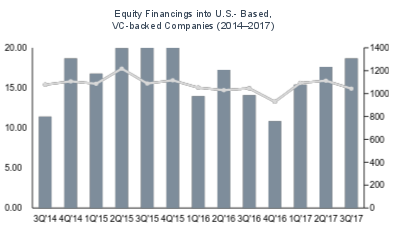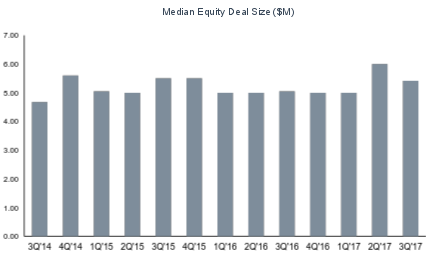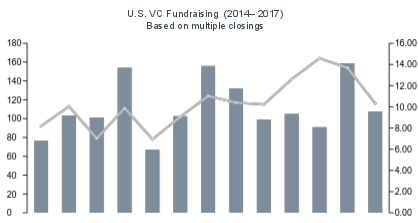
After things hit the skids at the end of 2016, and the venture capital bubble seemed to have burst, things are on an upswing once again, at least when it comes it comes to the amount being invested.
There was $18.68 billion raised in 1,043 venture capital deals in the third quarter of this year, according to the Venture Capital Report from Dow Jones VentureSource. The amount raised rose 6 percent, representing the third quarter in a row of increasing dollars.
The amount of capital invested is up 33 percent from the same quarter a year ago. The numbers aren’t where they were at the heights of 2015, but they are getting closer to that level than they been in a while.

The number of deals, however, went in the opposite direction, dropping 6 percent quarter-to-quarter.
Strangely, despite more money going to fewer deals, the median deal size actually decreased significantly from Q2.

More than a third of all dollars went to the business and financial services category, which roase 76 percent from Q2 to $6.91 billion, while the number of deals stayed flat. Healthcare companies raised $4.08 billion, or 22 percent of all dollars.
The top funding round during the quarter was WeWork, which raised $3.1 billion in August from SoftBank and its Vision Fund. While the round was reported as being $4.4 billion, Dow Jones VentureSource explains that approximately it only counted the $3.1 billion portion in its statistics because the other $1.3 billion was used to buy out existing shareholders.
That was followed by SpaceX’s $350 million round in July from undisclosed investors, valuing the company at $21.2 billion. The top four rounds were filled out by Auris Surgical Robotics, which raised $280 million in August, and OpenMall, which raised $270 million in September.
Venture funds
Meanwhile, Q3 was a down quarter for venture fundraising in terms of both funds raised and the amount raised. The percentage drops are pretty large, but the numbers aren’t quite as bad as they seem.
In Q3, there were 116 VC funds, which raised $9.58 billion. That represents a drop of 25 for the 32 percent for number of funds and 32 percent for the amount raised. However, looking at the chart, it seems like Q2 was more of aberration, and that the Q3 numbers are more in-line with the prior three quarters, at least in the amount raised.
The number of funds, however, did fall to the lowest level since Q2 2016.

The largest fund during Q3 was the $3.61 billion Insight Venture Partners X LP, a fund so big that it accounted for more than a third of the total venture capital financing raised during the quarter. The fund has not closed yet and has a target of $5 billion.
The second biggest fund was $1.5 billion raised by Institutional Venture Parters for its Fund XVI.
Exits
There has already been reports that the IPO market suffered badly in Q3, especially for tech companies. The DowJones report backs that up.
There were 7 venture backed IPOs, which raised $609.4 million, down 65 percent quarter to quarter, while the number of IPOs fell by 50 percent. And it doesn’t seem as though companies were taking other exit options either, as the number of companies that opted for M&As dropped to 129 from 153 in Q2, a 15 percent fall, and the amount paid for those companies went from $17.2 billion to $11.38 billion, a drop of 34 percent.
That included The Sage Group buying Intaact for $850 million, the largest deal in Q3. Meanwhile the largest IPO was Redfin, which raised $138.5 million, valuing the company at $1.4 billion, less than half of what Blue Apron raised in Q3, though that company’s lackluster performance, as well as the underperformance of Snap, have been partially blamed for the slowdown of IPOs.
(Image source: sg-dae.kxcdn.com)















